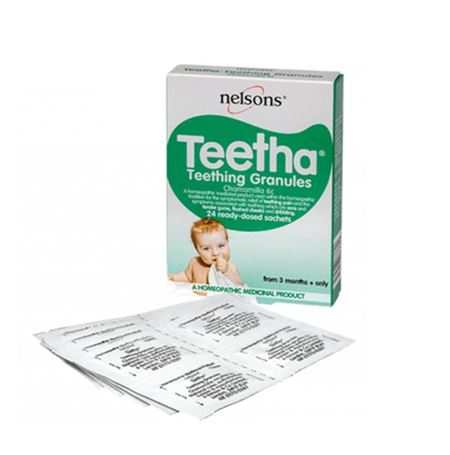Teething usually begins between the ages of four and nine months and most babies will cut their first tooth by one year. Some babies cut their first tooth as early as three months whilst others may start teething as late as one year of age. It is not uncommon for the teething process to last for up to 18 months from beginning to end.
Teething Begins
This usually happens at around 6 months (this can start as early as 3 months or as late as one year.) Teething unfortunately, can be a painful time for your baby and you might have to do a bit of comforting and deal with a lot of dribble because your baby’s gums may be sore and red where the new teeth are coming out.
The first teeth emerge: The first teeth will probably be on the bottom in the middle of the mouth and can generally be both the lower central incisors. Say hello to the upper middle teeth: At around 7 months (or between 6 to 8 months) the upper middle teeth (the upper central incisors) will emerge.
Time for your toddler’s molars: At around 12 – 16 months your toddler will get their first molars. It is usual for molars on the bottom and top to appear at the same time
Symptoms of teething
Drooling Teething stimulates the excessive production of saliva resulting in drooling. Drooling:
- Biting
A teething baby is known to bite on anything they can get their gums around. The pressure experienced from biting is believed to help babies relieve the painful pressure on their gums. At the same time parents may find that their baby refuses to eat or only eats very little.
- Irritability
By comforting or playing with your baby you can sometimes distract them from the pain in their gums. Your baby may sometimes be feeling too irritable or restless to play, but if not, it can be a good way of getting them to concentrate on something other than their teething pain.
- Sore Gums
Your baby’s gums are becoming increasingly sore and painful as the little teeth rise closer to the surface. Teething gums may be sore and red and you might even see little white dots or small openings where the next tooth is about to cut through (if your baby keeps its mouth open long enough for you to have a glimpse that is!) Your baby may be extra fussy when it cutting their first tooth and later when the molars come through due to their bigger size. Note: Sore gums may in severe cases cause fever and are even prone to bleed.
- Sleeplessness
The pain of teething is likely to have an effect on your baby’s sleeping quality and pattern. Babies who suffer from teething pain are more likely to wake up at night when the pain becomes too much. Sleepless nights occur most often when your baby cuts their very first tooth and towards the end of the process when the bigger molars come out.
- Flushed cheeks
The irritation of a new tooth coming through the gum can cause your baby’s cheeks to appear rosy and possibly feel warm
How to ease the pain?
As the teething process can go on for up to 18 months, many parents favour products that are gentle - just like Nelsons® Teetha®, the natural choice for parents.
 Nelsons® Teetha® Teething Granules are ideal to help soothe your little one while he or she is cutting new teeth. Nelsons® Teetha® Teething Granules are a homeopathic medicinal product used within the homeopathic tradition for the symptomatic relief of teething pain and the symptoms associated with teething which are sore and tender gums, flushed cheeks and dribbling. Filled into ready-dosed sachets, Nelsons® Teetha® Teething Granules allow for easy administration which is especially convenient when you are out and about • Contains Chamomilla 6c. • Always read the label. • From 3 months +
Nelsons® Teetha® Teething Granules are ideal to help soothe your little one while he or she is cutting new teeth. Nelsons® Teetha® Teething Granules are a homeopathic medicinal product used within the homeopathic tradition for the symptomatic relief of teething pain and the symptoms associated with teething which are sore and tender gums, flushed cheeks and dribbling. Filled into ready-dosed sachets, Nelsons® Teetha® Teething Granules allow for easy administration which is especially convenient when you are out and about • Contains Chamomilla 6c. • Always read the label. • From 3 months + Nelsons® Teetha® Teething Gel is a homeopathic medicinal product used within the homeopathic tradition for the symptomatic relief of teething pain and the symptoms associated with teething, which are sore and tender gums, flushed cheeks and dribbling. Suitable for babies from 3 months plus. This handy gel format is sugar free and easy to apply when you’re on-the-go. • Contains Chamomilla 12c, • Belladonna 12c and Aconite 12c • Always read the label.
Nelsons® Teetha® Teething Gel is a homeopathic medicinal product used within the homeopathic tradition for the symptomatic relief of teething pain and the symptoms associated with teething, which are sore and tender gums, flushed cheeks and dribbling. Suitable for babies from 3 months plus. This handy gel format is sugar free and easy to apply when you’re on-the-go. • Contains Chamomilla 12c, • Belladonna 12c and Aconite 12c • Always read the label.







